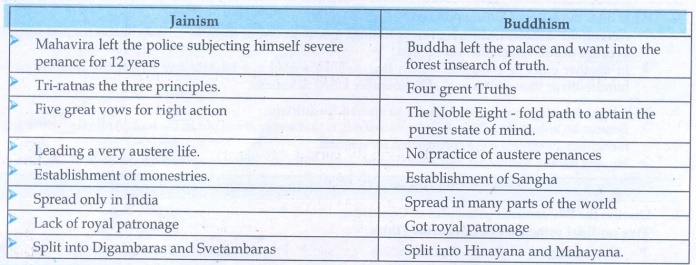Intellectual Awakening and Socio-Political Changes | History | Social Science - Answer the following in detail | 9th Social Science : History : Intellectual Awakening and Socio-Political Changes
Chapter: 9th Social Science : History : Intellectual Awakening and Socio-Political Changes
Answer the following in detail
VI. Answer the following
in detail
1. Discuss the five cardinal principles of Confucius.
Five cardinal principles
of Confucius Ethics.
• Humaneness
• Righteousness
• Propriety
• Wisdom
• Trustworthiness
Humaneness
• The superior man is not merely intelligent or scholarly, but his
character should be exemplary.
• The superior man possesses intelligence, courage and goodwill.
Righteousness
• Though obedience is insisted, "when the command is wrong a
son should resist his father and a minister should resist the prince."
• The ruler must govern the people impartially.
Propriety.
• Children should obey their parents and wife her husband.
• The ruler must appoint persons of character in the government.
Wisdom
• Wisdom grows from the family, and that the foundation of society
is the disciplined individual in an. orderly family.
Trustworthiness
• There are three requisites for government
• Sufficiency of food
• Sufficiency of military equipment
• Confidence of the people in their ruler
• The government should work with an ideal. It has duties towards
the people.
Confucianism is not religion : is a system
of social and ethical philosophy.
2. Compare and contrast the principles
of Jainism and Buddhism
Jainism and Buddhism
• Mahavira and Gautama Buddha left their palaces at the age of 30.
• Both the founders of Jainism and Buddhism did not prescribe killing
as a religious rite.
• Celibacy, securing livelihood by alms and abstinence from holding
property made both mahavira and Buddha much more acceptable.
• They lived a life of purity and exemplified simplicity and self
- denial.
• They lived in the times of the famous kings of Magadha, Bimbisara
and Ajatashatra.
• The Vaishyas turned to Buddhism and Jainism in their eagerness
to improve their social status.
• Buddha and mahavira revolted against the existing practices of
rites and rituals and proposed their ethical teachings.
• In course time, Jainism and Buddhism split into two branches.
Differences

Jainism
• Mahavira left the police subjecting himself severe penance for
12 years
• Tri-ratnas the three principles.
• Five great vows for right action
• Leading a very austere life.
• Establishment of monestries.
• Spread only in India
• Lack of royal patronage
• Split into Digambaras and Svetambaras
Buddhism
• Buddha left the palace and want into the forest insearch of truth.
• Four grent Truths
• The Noble Eight - fold path to abtain the purest state of mind.
• No practice of austere penances
• Establishment of Sangha
• Spread in many parts of the world
• Got royal patronage
• Split into Hinayana and Mahayana.
STUDENT ACTIVITIES ( For Students)
•
Prepare a case study of Asoka's Edicts.
•
Enact a drama about the life and teachings of Buddha.
Related Topics